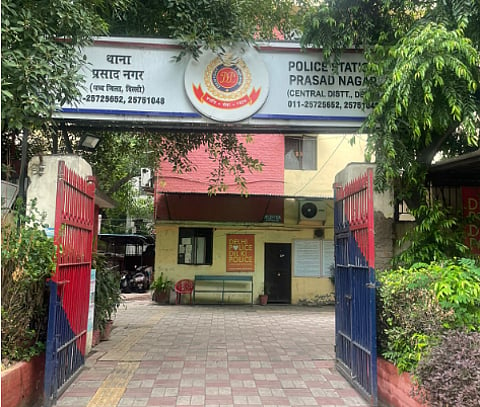
New Delhi- In a ground-breaking move that could reshape the landscape of gender equality in law enforcement, Advocate Satyam Singh Rajput, founder of the Justice for Rights Foundation, has brought to light a critical oversight in Delhi's police infrastructure.
Through meticulous research and strategic use of the Right to Information (RTI) Act, Advocate Rajput has uncovered a startling deficiency in menstrual hygiene facilities across the capital's police stations, potentially impacting thousands of women officers and civilians alike.
"This is not merely about sanitary pads," Rajput emphasized in a conversation with The Mooknayak. "It's about dignity, equality, and access to justice. When women—be they visitors, complainants, or police personnel—lack basic facilities, it creates an environment of discomfort and discrimination that can deter them from seeking help or performing their duties effectively."
The findings, detailed in a comprehensive representation to the National Commission for Women (NCW) and other concerned ministries, reveal that out of 209 police stations in Delhi, only two—a mere 0.96%—have installed sanitary pad vending machines. Even more alarmingly, these existing facilities at Bharat Nagar and Mukherjee Nagar police stations are reportedly poorly maintained, raising questions about their practical utility.
"This is not just a matter of convenience; it's a fundamental issue of dignity, equality, and access to justice," Advocate Rajput stated in an exclusive interview. "When we neglect the basic needs of women in our police stations, we're sending a message that their comfort and well-being are not priorities. This directly contradicts the principles of gender equality enshrined in our Constitution."
The representation, addressed to NCW Chairperson Rekha Sharma, the Ministry of Home Affairs, the Ministry of Women and Child Development, and the Commissioner of Delhi Police, outlines several critical issues:
Absence of functional sanitary pad vending machines in most police stations
Lack of separate and adequate washroom facilities for women
Unclear maintenance procedures for existing facilities
Possible inadequate budgetary allocations for improving access to menstrual hygiene products
Poor maintenance and unhygienic conditions of available facilities
Absence of proper changing rooms for women personnel
Inadequate waste management, particularly for menstrual waste
To address these concerns, Rajput has proposed a comprehensive action plan, including:
Conducting a thorough audit of all Delhi police stations
Implementing a time-bound plan to install sanitary pad vending machines
Ensuring the construction of separate, well-maintained washrooms for women
Establishing clear guidelines for maintenance and restocking
Allocating sufficient funds in the upcoming budget
Creating awareness programs within the police force
Issuing a circular making these facilities mandatory under Section 5 of the Delhi Police Act, 1978
The potential benefits of implementing these measures are numerous and far-reaching:
Pros:
Enhanced dignity and comfort for women in police stations, both officers and civilians
Increased willingness of women to approach law enforcement, potentially leading to better reporting of crimes against women
Improved working conditions for female police personnel, potentially boosting morale and job satisfaction
Alignment with constitutional principles of equality and dignity
Setting a precedent for other public institutions to follow
Raising awareness about menstrual hygiene as a public health issue
Potential increase in the number of women joining the police force
Improved public perception of the police force as a gender-sensitive institution
The lack of proper facilities has a direct and significant impact on women police officers, who form an integral part of Delhi's law enforcement. Advocate Rajput emphasized this aspect, stating, "Our women officers are on the frontlines, serving long hours and facing challenging situations. The least we can do is provide them with basic amenities that respect their dignity and address their health needs."
The absence of adequate facilities can lead to:
Increased stress and discomfort during work hours
Potential health issues due to lack of proper sanitation
Decreased job satisfaction and morale
Challenges in managing menstrual hygiene during long shifts
Possible reluctance of women to join or continue in the police force
Reinforcement of gender-based discrimination in the workplace
By addressing these issues, the proposed measures could significantly improve the working conditions for women officers. This, in turn, could lead to increased retention rates, better performance, and a more diverse and representative police force.
"We're not just talking about installing vending machines," Rajput added. "We're talking about creating an environment where women feel respected, valued, and empowered to carry out their duties without unnecessary stress or discomfort. This is about recognizing that gender equality in law enforcement goes beyond numbers—it's about providing equal opportunities and conditions for all officers to excel in their roles."
"This is a litmus test for our commitment to gender equality," Rajput concluded. "The way we handle this issue will send a strong message about how seriously we take women's rights and dignity in our society."
As Delhi awaits the response from the NCW and subsequent actions from the authorities, this initiative by Advocate Satyam Singh Rajput and the Justice for Rights Foundation stands as a beacon for gender equality in public institutions. It serves as a reminder that true progress often begins with addressing the most basic, yet crucial, needs of all individuals in society.
You can also join our WhatsApp group to get premium and selected news of The Mooknayak on WhatsApp. Click here to join the WhatsApp group.